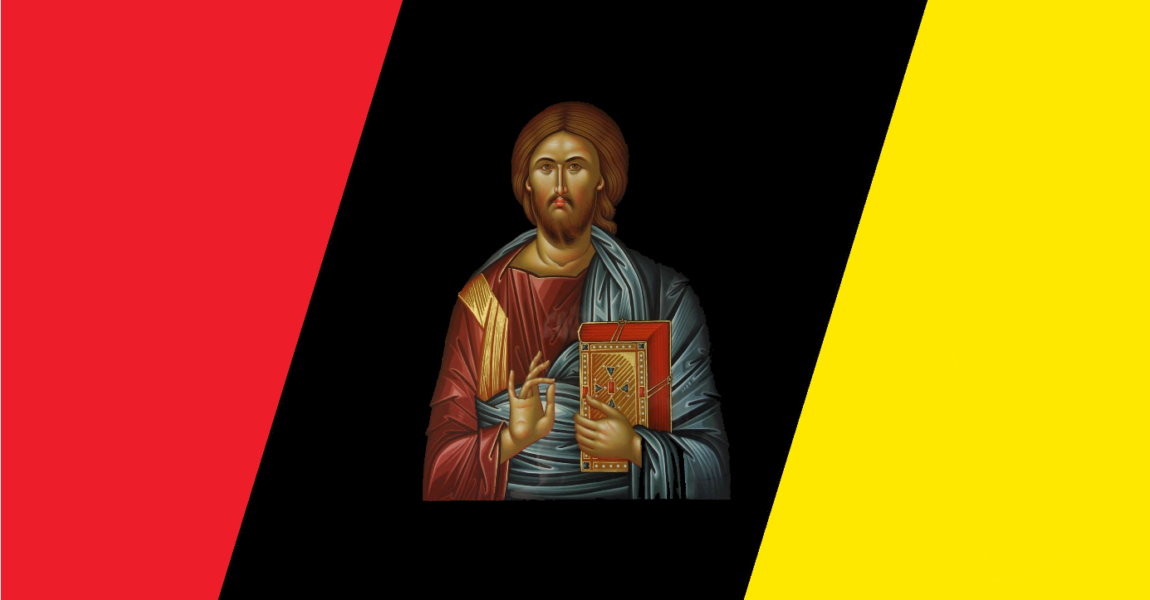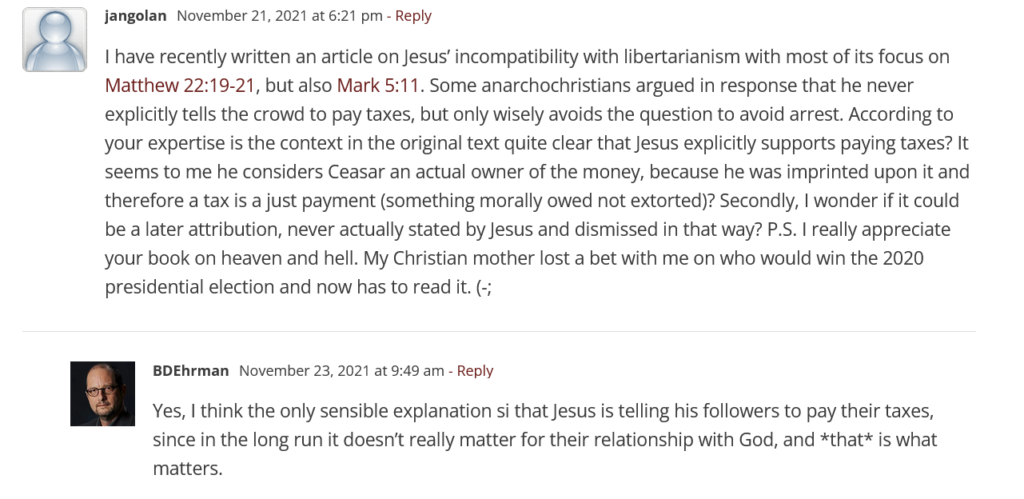
By Ian Golan
Though prevalent amongst libertarians, the phrase “taxation is theft” is slightly imprecise, as governmental confiscation of our assets is best described by the word extortion. The threat of the state, sending their mercenaries to make one pay the “price for civilization”, even if they may kill one in the process, is ever present. Therefore, a libertarian worldview is inevitably against extortion. Any credible threat against our lives to achieve desired means without an initiation of aggression from our side is considered inherently immoral, by any libertarian philosopher.
For a moment let’s imagine the most horrific version of such undesirable extortion possible. A state so powerful it can make you follow its will to the utter perfection. No crime goes unpunished, no misdeed is unknown. Let your eyes see the Orwellian vision of perfectly engineered system of control, which can know even the tiniest of thoughts crossing the minds through the infallible eye of Sauron. And not only it has a perfect grasp of reality, but also administers the gravest of punishments for those who dare to go against its wishes. The least of insurgence against its power will be eventually punished with severity above any pain known to man before. Its omniscient archive of all human actions is only less evil than the omnipotent ability to administer punishment. The most horrid state of existence that can be inflicted, infinite like hell. Actually, let’s call it hell.
Some reader might have realized at this point that the described state at its most totalitarian bears an uncanny resemblance to a creature described in religious tradition. An omniscient God who through fear of the greatest imaginable punishment forces people to follow his will. The administrator of the ultimate extortion.
Hell is an example of the greatest extortion one can ever imagine. Going to hell for opposing god’s will is the most dreadful experience possible under Christian worldview. A deviation from god’s wishes will inevitably lead to punishment sufficient to struck fear into the bravest hearts. Whether it is some more nuanced lack of god’s presence or seven-layered Dante’s inferno, theologians always conclude that such state is the worst possible suffering for human souls. Thus, a libertarian Christian is an oxymoron. At its most fundamental level Christianity is all about submitting to the grandest extortion imaginable.
Still, many of the most profound libertarian or anarchist thinkers see Christianity as completely compatible with libertarian thought. And who am I to question the judgement of Leo Tolstoy, Ron Paul, and Ludwig von Mises?
I am a mere skeptic who is unconvinced that Christianity is compatible with the belief in severely limited or non-existent government. Thank God that most Christians are in complete agreement with my position. Despite having a book which says it will not create any confusion (1 Corinthians 14:33), they are severely confused and conflicted about the ethical nature of the state, morality of taxes, divine rights of the rulers, and even existence of the non-aggression principle. It is self-evident that a plenitude of government enthusiasts notice egalitarian, anti-capitalist message, and support for their statism in early Christian writings. An important question therefore arises. What would Jesus do … with our economy?
I remember that as a teenager libertarian and a devout Catholic I was astounded during one of the Bible study sessions when we read a passage from the gospel of Mark. The action of Jesus that set out before us stood in plain contradiction with my libertarian worldview. And it was not one of those disputed Bible chapters, where one could argue that a translation mistake or insertion of a later story invalidates the whole issue. It was not a missed nuance nor a misreading of God’s intention. Plain and undeniable contradiction. I felt like one of my beliefs had to go. After a long period of intellectual struggle, I had to conclude, that I had more evidence for the political necessity of free markets and free minds than that Jesus was a son of God. The story, which so vastly shaped my understanding of the world comes from Mark 5:
“They came to the other side of the sea, to the country of the Gerasenes. And when he had stepped out of the boat, immediately a man out of the tombs with an unclean spirit met him. (…) When he saw Jesus from a distance, he ran and bowed down before him; and he shouted at the top of his voice, “What have you to do with me, Jesus, Son of the Most High God? I adjure you by God, do not torment me.” For he had said to him, “Come out of the man, you unclean spirit!” Then Jesus asked him, “What is your name?” He replied, “My name is Legion; for we are many.” He begged him earnestly not to send them out of the country. Now there on the hillside a great herd of swine was feeding; and the unclean spirits begged him, “Send us into the swine; let us enter them.” So, he gave them permission. And the unclean spirits came out and entered the swine; and the herd, numbering about two thousand, rushed down the steep bank into the sea, and were drowned in the sea. The swineherds ran off and told it in the city and in the country. Then people came to see what it was that had happened. (…) Then they began to beg Jesus to leave their neighborhood.”
Jesus faces a legion of demons, whom he grants permission to enter a flock of swine that does not belong to him. He treads on somebody else’s property, with the result of absolute destruction in its entirety. He is perfectly able to cast out demons without causing damage to anyone’s livestock as demonstrated by other accounts of exorcisms in the gospels and the mere fact of his godly omnipotence. For the pleasure of the demons, he brings destruction upon the flock. He does not make any attempt to compensate for the caused damage. He does not seem to be concerned about the fate of the peasants who were affected by the calamity he has caused. Two thousand pigs were lost to his vanity! Source of food and income of the whole village vanished. In the end, inhabitants just beg Christ to leave them alone.
A standard response of Christian apologists, who would be less concerned with the intrusion on freedoms and property rights of the shepherds and more with breaking the sixth commandment would argue that any ownership does not apply in this case. God as a creator is in possession of his creation and therefore Jesus owned everything that was destroyed in this situation.
Dozens of impoverished shepherds and their families slowly starving to death because their only source of income got killed by an insane messiah, must be a case where no reasonable cause for violating property rights exists. And even if they were not the owners of the pigs, one can only contemplate the severe punishment they would face for Jesus’ derangement. Flogged to death or thrown into prison for theft of the flock. No one can expect the owner of the shed to believe that the pigs got possessed by demons.
Even if you do not care about humans, you should at least be concerned with the fate of animals in this tale. Drowning is arguably one of the most horrific deaths one can go through. The water slowly fills out your nostrils, your throat, your lungs. You desperately try to catch a breath. If you try to keep your mouth shut, then an involuntary bodily mechanism will eventually make you open your lips. Slow, cruel death. And to what end was all of this pain and suffering caused? To please a demon. Well, a legion of demons, if it makes it any better. If this whole story is not offensively absurd, then it is certainly offensively unethical, but also deeply anti-libertarian.
The most despicable act for any libertarian may perhaps be slavery. Jesus himself does not take the stance on that issue in the gospels, however, it can be well approximated from writings of the early Christians, his parables, and ultimately his silence. What does the divinely inspired word of God say outside of the four gospels? For the sake of time, I will skip the Old Testament passages where Jews are allowed by God to own slaves and even beat them as long as they do not die within two days (Exodus 21) to concentrate on what his “first followers” had to say. A multitude of Christians disagree with the majority of God’s works in the “less joyful” part of the Bible and marginalize their importance as “first covenant” or “harsh historical circumstances” anyway.
The letters of Peter provide us with plenty of insight into the moral beliefs of early Christians passed on from Jesus himself. Though, it is highly unlikely that the first pope is actually the author of the text since the Bible itself mentions that he was illiterate. Either way, Christians consider the epistle inspired by God, so it does not change the line of reasoning or importance for moral doctrine.
“Slaves, accept the authority of your masters with all deference, not only those who are kind and gentle but also those who are harsh”
No libertarian could ever utter such a sentence. Unless he is reading the following passage in a church. But then he should leave that church, shake the dust off his feet and never come back. And it is not only saint Peter who holds a reprehensible view of slavery. Paul does not seem to notice anything even potentially immoral about ownership of other people. Colossians 3:22:
“Servants, obey in all things your masters.”
At this point, it is simply meaningless to comment on the passage. If Paul and Peter were to watch Quentin Tarantino’s Django Unchained, they would conclude that the plantation owners were the morally superior characters in the story, while ex-slave Django trying to help his enslaved wife escape was the evil villain. She should be obedient to the masters not conspiring to break from her chains.
No, if you are a slave, you should not be obedient in every aspect of life quite the opposite. You should do as little work as possible while minimizing punishment. If an occasion comes, you should rebel and escape your owners. That is the primary focus of your life once you find yourself in a state of enslavement. What does the messiah say himself? Luke 12:47, 48:
“[Jesus speaking] “And that slave, which knew his lord’s will, and prepared not himself, neither did according to his will, shall be beaten with many stripes. But he that knew not, and did commit things worthy of stripes, shall be beaten with few stripes.”
Jesus demonstrates his compassion by advising us that some slaves should not be beaten as hard as other slaves because they did not know any better. It would be surprising for Jesus to denounce slavery while he justified the use of violence by slave-owners. Not only slavery seems to be considered by the messiah an appropriate relationship between humans, but corporal punishment for misbehavior is considered a just act. Although Jesus does not explicitly endorse ownership of people in the following quote, he certainly normalizes such a relationship.
All four gospels lack his clear stand on that issue. However, Christ’s silence on the topic of slavery is a piece of evidence as well. If one were to oppose the ownership of other people as property in the times of ancient Rome, we would expect it to be a vital component of his teachings. Unethical activity so widespread and damaging certainly would garner significant attention of a moral teacher. It can also be assumed that his followers would notice his very controversial at that time stand. At least one gospel writer would remember that Christ opposed the status quo in that aspect. But the text we have perfectly fits the narrative that we would see in the opposite case. If Jesus would have nothing against slavery, he simply would not mention it in his teachings. He would not be concerned with that issue. Instead of versatile opposition towards ownership of people, we have silence.
Still a libertarian-inclined theologian could protest here and mention the story from the book of Exodus. God sets 2.4 million Israelites free, giving us a wonderful anti-slavery message. Well not exactly. Firstly, all historical evidence suggests that the story is a myth, and Moses is merely a legendary figure. However, if we set aside historical reliability of the story, it is a tale, which quickly devolves into severely anti-libertarian territory. Israelites led by Moses into desert spend there 40 years, until they go on to conquer the promised land. Why would they have to conquer a land that should be theirs? Because it is a rightful property of Canaanite tribes residing there for many centuries. Led by divine command Israel decapitates the inhabitants, ransacks the villages, stains the fields with blood, and uses God’s intervention to break down the walls of the city of Jericho, the only protection of the innocent civilians from brutal invaders. Scripture time after time shows the Lord, or rather the Warlord, instructing that non-Israeli men shall be decimated, and their daughters taken into sexual slavery. Who cares about lives of the Midianites, Hittites, Amorites, Canaanites, Perizzites, Hivites and Jebusites when God’s plan for salvation is in play?
Do I even need to explain why slaying people to take over their land might not be acceptable for libertarians who fiercely oppose US military interventions with far lower kill rates than that of the Chosen Nation?
Any apologetics around the topic only works with a notion of a powerless henotheistic god, who lacks either imagination or capabilities. An omniscient God does not promise land, which happens to belong to other humans. An omnipotent God creates a place for life of his chosen nation without killing thousands of previous landowners in the process. A creator of the entire universe can conjure up an appropriate island in the middle of the Mediterranean Sea, to make a home for Israelites. The one who sets in motion celestial bodies can provide his beloved tribe a safe haven in some desolate place on Sahara Desert, after he creates a functioning ecosystem with some of the water left over after the global flood. Yahweh has enough power to kill all first-born children in Egypt, but cannot shift a few tectonic plates, so that his people could occupy a newly emerged from water land without getting dozens of Canaanite tribes extinct.
One biblical passage, which instantly comes to mind when trying to find some libertarian thought in his teachings, is the one where the Jews ask Christ if they should pay the taxes to the Romans. Christ answers in Luke 20:25:
“Render unto Caesar the things that are Caesar’s, and unto God the things that are God’s”
Quite disappointing. Someone should have reminded him that taxation is theft. The justification laid out by Jesus is even less convincing, than “taxation is the price for civilization” or “you consent to taxation through social contract”. Statists improved their rhetoric over years. Christ simply believes that Caesar has the right to tax you all he wants. He considers the money taken away in taxes as rightfully belonging to the state. He points at the imprinted image of Caesar on the coin, to conclude that therefore he is a rightful owner of the money. I have even consulted on the issue with renowned New Testament scholar, Professor Bart D. Ehrman, who agreed that Christ is evidently telling his supporters to pay taxes.

Whatever tax rate Caesar declares it is not an immoral extortion, but a matter outside of God’s consideration. It must be noted that the tax Jesus ruled in favor of paying was minuscule in comparison to modern and medieval standards. Jews had to pay one dinar to the Caesar, which was an equivalent of a wage for one day of labor. An obvious correction must be made for poverty. The overall share of absolute necessity in spending of citizens in antiquity was much higher, and therefore taxation had to be lower. Roman Emperor simply could not impose a forty percent income tax because half of the taxpayers would vanish after an epidemic of famine.
The following evidence seems to suggest that Jesus had nothing to do with libertarian principles. It would even be naïve to expect a bronze age figure to believe in a political philosophy dating back to the seventeenth century. None of those ideas existed two thousand years ago. However, it is necessary to at least expect a Son of God to restrain from completely contradicting the principles one believes. If one holds unregulated markets and private liberties as self-evident, then they cannot be stifled by an all-wise, all-knowing God. Either Jesus was not a son of God or God is a statist.


